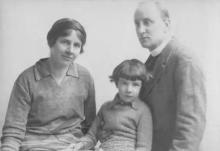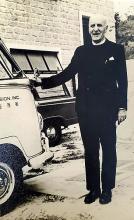Vyvyan Henry Donnithorne was born in 1886. He had an older brother and three sisters. He was educated at Christ's Hospital in West Sussex and after studying engineering at the University of London College of Engineering, he became an engineer in London, becoming technical manager for a company manufacturing X-ray apparatus for hospitals all over the UK. His career path looked set.
However in 1909, aged 23, he found himself in Keswick during the annual Convention and through conversations with evangelical Christians there and reading the Gospels for himself, came to a real faith of his own. Within a fortnight of his conversion, he discovered and joined the Cambridge University Mission to Bermondsey, establishing Christian boys' clubs in the darkest slums of London's east end. He worked there in his spare time over the next three years, during which time his heart began drawing him to the mission field, and China in particular.
He therefore took the Chinese Tripos at Clare College, Cambridge, graduating in 1914, but then he enlisted in the army for the next three years. However, a severe leg wound at Loos, France in January 1916, for which he received the Military Cross, ended his military career.
While he was recuperating back home in Twickenham, London, he was visited by Gladys Ingram, whose family lived close by. The two became close, Vyvyan proposed, Gladys accepted, and they became engaged. The couple were then separated for the next 3 years as Gladys went out to Egypt to work with Oswald Chambers in the YMCA at Zeitoun. Vyvyan returned to Cambridge for post-graduate study in 1919, studying theology for a year at Ridley Hall.
Gladys returned from Egypt that year and they married in September. Also in that year Vyvyan was ordained and in November they went out with the Church Missionary Society to Szechuan Province in China where after two years of language study, Vyvyan was appointed to pioneer evangelistic work not only in the frontier city of Anhsien, but also seven other outstations, each with a church and Chinese pastor. In addition a visit had to be paid once a year to the furthest outstation of Mowchow on the China Tibet border. The work involved a lot of walking on his mended leg, there being no transport, but the happy outcome was a fully restored left leg.
In 1922 their one daughter Audrey was born in Santai, Szechuan.
In 1925 following the Shanghai incident there were anti-British uprisings in China and they were captured by Red Lantern bandits with 6 other missionaries for 3 weeks before being ransomed and rescued.
From 1935 to 1949 he served as archdeacon of the Anglican Diocese of West Szechuan. Daughter Audrey says that also on offer at the time was a parish in Falmouth, which she feels her father might well have preferred in his home county of Cornwall, but her mother, missionary through and through, had strongly opposed it. During this period they left the CMS and formed their own group of like minded missionary friends called The West China Evangelistic Band.
During WWII the Donnithornes returned to England (1943-45) but then went back to Szechuan Province to base themselves in Beipei for the next few years.
In 1949 when the Communists took over Szechuan Province, Vyvyan was in England, and had to wait two years for Gladys to be deported to Hong Kong to then join him in 1951.
His final posting was as pastor of a church in the Canary Isles until 1953 when he and Gladys retired to Hong Kong. They lived in a flat in Kowloon Tong, and their church was St Andrews, Kowloon.
In Hong Kong, ‘advancing years did not deter them’ from lives of service and good works. They gave assistance to refugees from China and gave support and assistance to the Shatin Babies' Home, amongst other things.
When Audrey visited in 1967 she felt her father was feeling the weight of his years, whereas her mother remained busily active. In December 1968 Vyvyan suffered a bad stroke, not his first, and he was admitted to the Matilda Hospital on the Peak, which offered free treatment for missionaries. He died that same month, aged 82.
Archdeacon Donnithorne was buried in the Hong Kong Cemetery. Gladys remained busy until her death in 1977, and she was buried with him.
----------------------------------------------------
Sources: Wikipedia; MichelleUle.com
China in Life's Foreground - Audrey Donnithorne
The Yip Family of Amah Rock - Jill Doggett


Comments
The Donnithornes and The Shatin Babies' Home
The Donnithornes were keen supporters of Mildred Dibden and The Shatin Babies' Home. Their arrival in HK coincided with the move into the Old Police Station in May 1953 and they got busy straightaway - 'Mrs Donnithorne, of the West China Evangelistic Band, organised the arrangement of the furniture in all the rooms ...Her husband, the Venerable Archdeacon V H Donnithorne, frequently plodded with her along the dusty tracks leading up to the home on the hill. Advancing years did not deter them....When the great day came...Mrs Donnithorne, with willing volunteers (from the Toc H) had all the furniture in place so that all the babies (16 at this time) could be put straight into their cots. Then there was tea for all the adults.'
A lot of this furniture was provided by two Chinese benefactors, Mr Ching King-sun and Mr Pang Iu-man, who were keen to help the good work.
Source: The Yip Family of Amah Rock by Jill Doggett
Shatin Old People's Home
The Donnithornes get a mention in one of Mildred Dibden's newsletters to supporters in October 1959:
'Another special joy has been the opening of the Old People's Home here in Shatin! God put a wonderful thought into the hearts of Archdeacon and Mrs. Donnithorne which has now developed into fact. These old folk, taken from the most miserable of conditions, homeless and uncared for, now have a home, a pretty garden and proper care. And they feel, too, that it IS their home, and that they have a responsibility to welcome visitors and show them round. Isn't it a lovely thought to become fact? On the day they moved in, Esther Leung and I went along to help where we could. It was the happiest occasion - the old folk so smiling and thankful. It just filled our hearts with praise to God. We pray that He will bless and prosper the work, and glorify His Name there.'